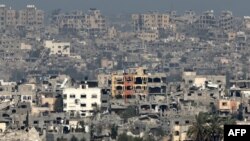Israel's military carried out airstrikes and ground operations throughout the Gaza Strip on Wednesday, while negotiators in Egypt worked on a potential cease-fire plan that would pause the conflict for several weeks.
The Israel Defense Forces reported an airstrike in the Beit Hanoun area of northeastern Gaza that killed two militants who were involved in the October 7 terror attack against Israel.
Other Israeli strikes took place in central Gaza and in the Khan Younis area in the southern part of the strip.
British Foreign Secretary David Cameron said he planned to issue a warning to Israel Wednesday about the need to facilitate more humanitarian aid getting into the Gaza Strip to address what Cameron called "dreadful suffering."
Cameron said he would raise the issue during a meeting with Israeli war Cabinet member Benny Gantz during a visit Wednesday.
Mediators push for cease-fire
International mediators met Wednesday in Cairo amid a push to secure a 6-week cease-fire before the start of the Muslim holy month of Ramadan on March 10.
U.S. President Joe Biden said Tuesday the question of whether there will be a new pause in fighting is "in the hands of Hamas right now." But at the same time, he said Israel had "no excuses" but to allow more humanitarian aid into the war-torn territory to assist famished Palestinians.
The United Nation's acting humanitarian coordinator for Palestine said Wednesday that displaced Palestinians sheltering near Rafah, along Gaza's border with Egypt, have started leaving the area because they fear warnings by Israeli Prime Minister Benjamin Netanyahu of a military incursion by Ramadan.
"They have moved back north to Deir Balah, some to Khan Younis, and many of them have gone to Al Mawasi — which is the area on the sand dunes on the coast," Jamie McGoldrick told reporters virtually.
Israel OKs aid delivery
McGoldrick, who just returned from a 2-day visit to Gaza, also said aid workers are preparing dual contingency plans — one in anticipation of a possible cease-fire, the other in case of an Israeli incursion into Rafah.
Israel has said it would move the Palestinians to safety in advance of an attack on Rafah but has not said where they would be sent.
Unable to safely pre-position aid supplies within Gaza, McGoldrick said neither aid workers nor Palestinians seeking safety have any "easy options." He also said U.N. officials have received a "green light" from Israel to start using a road previously reserved exclusively for Israeli forces. The north-south arterial that runs parallel to Gaza's eastern border will allow aid to come in through the Kerem Shalom and Rafah crossings and go directly to the north, which has been hard to reach.
The U.N. plans to do reconnaissance of the road on Thursday to see if it is free of unexploded ordinance, and to find suitable storage and distribution sites, possibly a soccer stadium, he said.
Israel has stayed away from the Cairo negotiations, faulting Hamas for not providing a list of the names of hostages who militants are still holding in Gaza.
A senior Hamas official told reporters Tuesday that Netanyahu is to blame for a lack of a deal, and that it is in the hands of Israel's ally, the United States, to push for action.
For Biden to say publicly that the decision is in Hamas' hands is "a form of pressure" common to high-level negotiations, said Merissa Khurma, program director of the Middle East Program at the Wilson Center.
"We've seen Hamas respond to some of these statements, as well," Khurma told VOA. "That is part of the process. It's using the public platform to pressure the private negotiations that are taking place."
But she stressed the dire humanitarian situation in Gaza presents the ultimate pressure on negotiators to reach a deal that will halt fighting.
"It's a reminder of how important these negotiations are to get us to this first step of a cease-fire, a much-needed humanitarian pause, to get aid in and to return the hostages so that we can start to think about what the future of the conflict and post conflict looks like," Khurma said.
Israel has vowed to end the threat of another Hamas assault like the October attack that killed 1,200 people, according to Israeli tallies. Since then, Israel's counteroffensive has killed more than 30,700 people in Gaza, about 70% of them women and children, according to the Gaza Health Ministry. Another 72,100 Palestinians have been wounded.
VOA's Jeff Seldin, Margaret Besheer and Anita Powell contributed to this report. Some information is from The Associated Press, Agence France-Presse and Reuters.







